Can funding for social care be fixed?
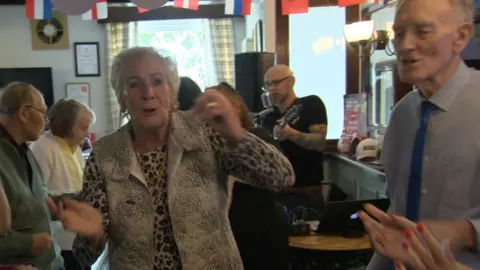 BBC
BBCIt's lunchtime at the Union Arms in Tyldesley and the place is packed with groups of people laughing and chatting.
This is the Forgotten Regulars club – a monthly meet up for people with dementia, their carers and those who have lost loved ones to the disease.
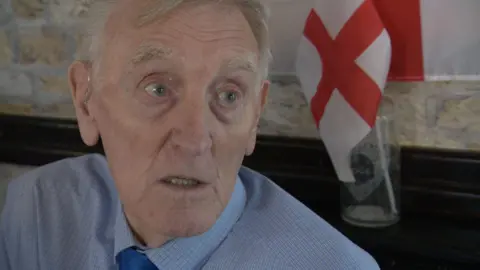
Eric Woolfenden first started coming with his wife, who he looked after for seven years, when she died, he continued to attend.
"We're amongst similar people going through similar things.
"Several people here have dementia so we're all in the same boat if you like," he said.
Denise Ashworth is sitting quietly in a corner with her husband David, who had a major brain aneurysm when he was 39 resulting in lifelong damage.
She has cared for him ever since: "We're 76 now, he's 77 in November."
For Denise the club is a rare chance to socialise as a couple, she said: "Normally he won't go out. He won't go to the supermarket with me, he wants me to get him a newspaper, but he will come here."
'No funding, no help'
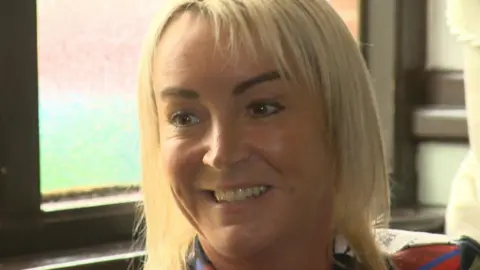
The Forgotten Regulars sessions were started 10 years ago by pub landlady Sharon Mattin when her own mum developed dementia.
She realised music and socialising helped her and started a Music for Memories session.
"We used to bring nana to it and she loved it. She passed away with dementia but we've carried it on in her legacy," Claire Burrows, Sharon's daughter said.
Claire said up to 80 people now come along. Everyone gets a free meal and there's also live music and a dance.
"A lot of these people here, they're on their own with their partners, they get no funding, they get no help, they never get a minute to themselves, so it's very hard. It's a lot of time, it's demanding," she said.
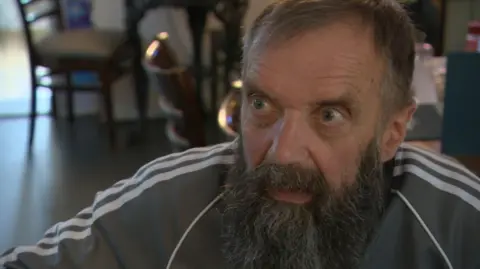
The latest official figures show nearly one in 10 of people in the north west of England is an unpaid carer.
A third of those carers put in more than 50 hours a week.
Basil Light has been caring for his wife Sandra for the past nine years while also dealing with his own Parkinson's disease.
Referring to his own illness, he said: "That doesn't help but we just do it don't we?"
He added: "I've been married to her for 52 years, I don't want to send her anywhere."
Anguish and relief
Social care is closely linked with the NHS. Hospitals are full of people who could be looked after elsewhere if the system was better.
Both are struggling to meet demand from an older and sicker population, but there is also a fundamental difference.
There is no National Social Care Service.
Those who need help often have to navigate their way through a confusion of private and public organisations - and while the NHS is free, many people have to pay for social care.
Particularly when someone needs residential care, the overall cost can run into the tens of thousands.
Some of the carers told me about their own experiences of funding residential places for loved ones.
One had paid £3,200 a month; another, £1,000 a week. A lifetime's savings disappearing at a dizzying rate.
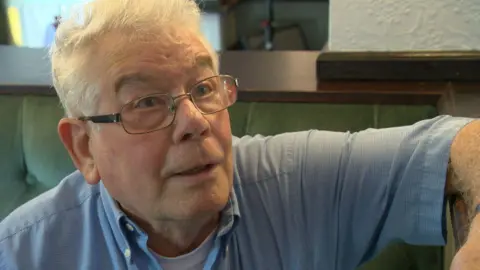
"Everybody's worried about money in the beginning," Rod Sellers told me.
His wife has been in care for the past six years. "For the first two months it was going to cost £6,000," he said.
"Fortunately I had a good social worker and she discussed it with the home manager and it was reduced to £3,500."
Rod only had to pay for the first two months as his wife was then sectioned, which meant the NHS took over her care.
This was a story I heard a number of times from carers - the anguish at a loved one's decline combined with relief that the state was finally picking up the tab.
"Financially it would have drained anything we had - any savings or anything," Rod said.
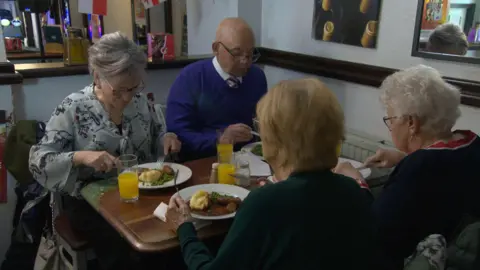
Simon Bottery is an expert in the challenges facing social care at The King's Fund – a think tank which specialises in health policy.
He said care costs for many can be "catastrophic".
"Something like one in seven people will face lifetime care costs of over £100,000. That can actually be £200,000, £300,000 so we need to do something to prevent that from happening," he said.
There are other, well-known challenges facing the social care sector.
Much of it is paid for by the local authorities, who have seen real terms cuts to their budgets for years and so cannot properly fund what they need.
That means businesses operating care services – both residential and in the person's own home – often don't receive enough money to pay competitive wages.
So staff vote with their feet, either moving to the better paid NHS or leaving the sector altogether for something less stressful.
'Not rocket science'
Brexit and then Covid exacerbated the problems.
Many workers, particularly in care homes, felt forgotten about and traumatised by the experience. Many left the profession.
The latest figures from Skills for Care, which compiles data on adult social care, shows 19,000 vacancies in the north west – 7.6% of the workforce.
For decades successive governments of all hues have declared something radical must be done to solve the issues faced by social care.
Plans have been drawn up - but no government has so far carried through the policies needed to raise the funds for those plans.
"It's not something that can be swept down the road any further. We need some immediate actions and we also need a long term plan," said Mr Bottery.
He wants to see a number of reforms including a cap on care costs, due to be brought in last year but then delayed.
"None of us knows whether we're going to get dementia in later life," he said.
"Having some sort of insurance, in the loosest sense of the word, so that we are all contributing… to a system which can properly support us if we need to use it, to me that makes a lot of sense and I think the public gets that.
"It's exactly the same principle which underlines the NHS... it's not rocket science.
"Ultimately we know what needs to be done, we've got a good idea of what it will cost and we're not talking absolutely astronomical sums."
But we are talking billions of pounds – last year The Health Foundation estimated it would cost about £8bn a year, rising to £18bn by 2033.
In the current economic climate few politicians in the main parties want to discuss how best to fund this.
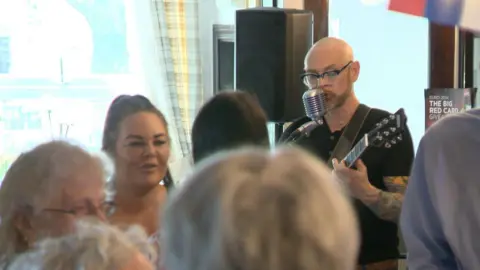
Back at the Union Arms, the singer is belting out a rousing version of The Killers song Are we Human or are we Dancer? The floor is packed, everyone singing along.
Claire is planning the annual fundraiser for the bank holiday weekend. The pub also runs a GoFundMe page to help with the cost of the meals and entertainment.
She wants the new government, whoever that is, to make social care a priority but doesn't sound hopeful.
"I just think it really massively needs looking at financially and a lot of support needs doing. I think too much goes unnoticed," she said.
"It's a shame, it's sad but that's the way it is and that's the way the UK is, unfortunately."
It's time to go home.
The singer gets an enthusiastic round of applause.
The Forgotten Regulars head off, shouting goodbyes and thanks.
When they next meet, in a month's time, a new government will be in power.
How much that will change life for them is uncertain.

Poll tracker: How do the parties compare?
Voting: Who can I vote for in the general election?
General election 2024: All BBC stories and analysis
Your Voice, Your Vote: Tell us the issues that matter to you
Watch BBC North West Tonight on BBC 1 at 18:30 BST, listen to the best of BBC Radio Manchester on BBC Sounds and follow BBC Manchester on Facebook, X and Instagram. You can also send story ideas to [email protected]
